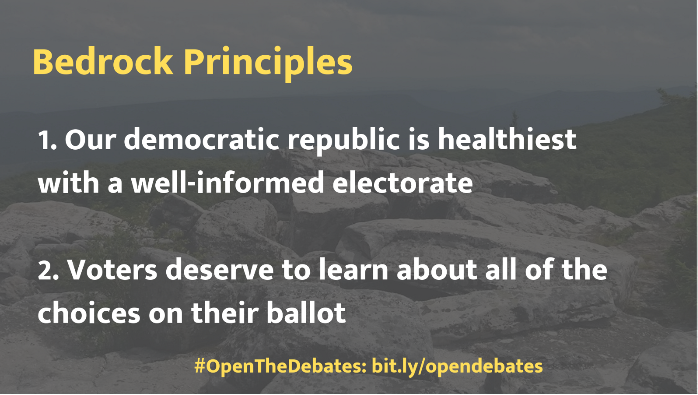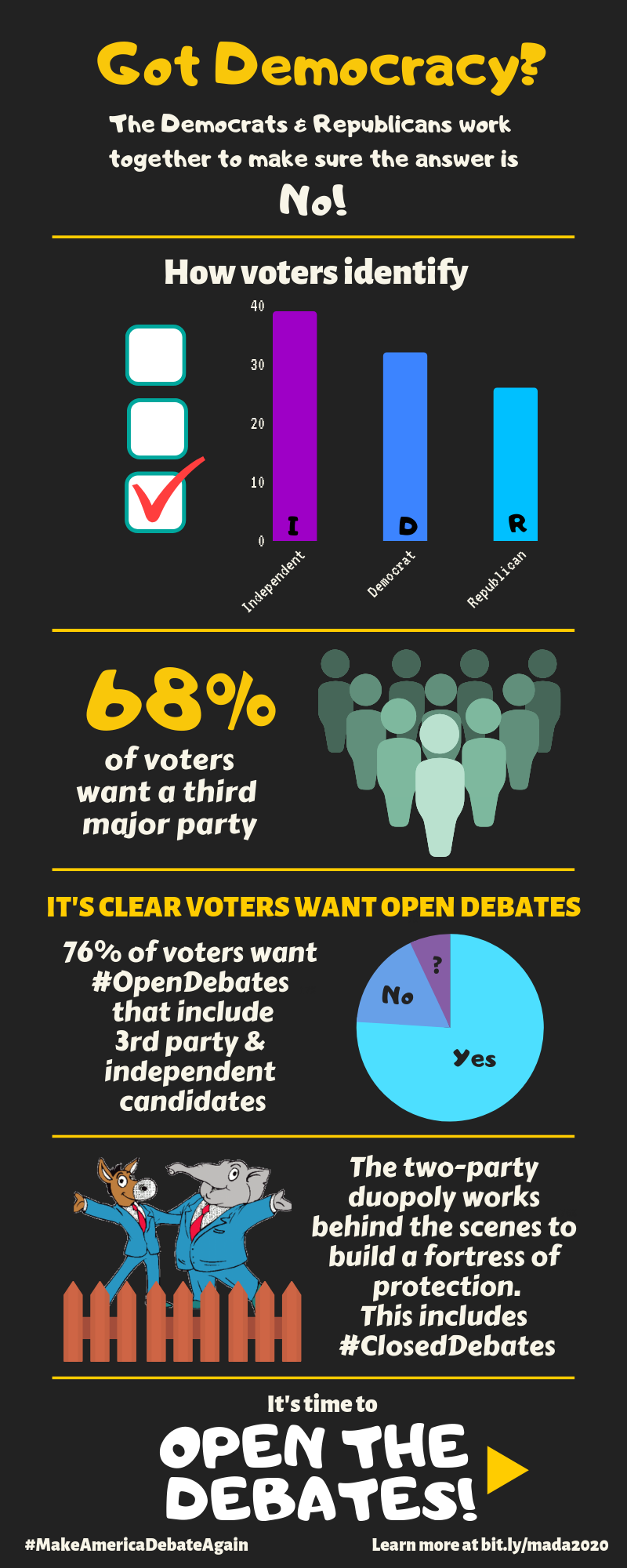#MakeAmericaDebateAgain: A Stronger, Healthier Republic Requires Open Debates

It’s 2019 and the United States of America still has a democracy problem.
A few powerful studies have summed it up differently, but the heart of the problem is that despite Lincoln’s claim that we ever had a government of, by, and for the people, we have always had unrepresentative and unresponsive government. In recent decades it has only gotten worse.
Over that same time period, the Democratic and Republican parties have worked hand-in-hand to build up a powerful fortress of protection over their shared grip on power. Starting with the founding in 1987 of the explicitly bipartisan Commission on Presidential Debates, the two parties have fought to keep third party and independent candidates off the presidential debate stage by any means necessary, including the threat of arrest, and even the shackling two third party candidates to a chair for eight hours.
ALSO READ: Courts to Decide Fate of Debate Commission's Exclusionary Rules
Why go to such an extreme length to prevent third party candidates from speaking to the American people? Because the duopoly’s fortress of protection has significant weak spots, and the dramatically unpopular notion of closed debates may be the biggest one. A timely poll on the question of exclusive or inclusive debates in the 2016 presidential election had 76% of likely voters calling for open debates, with 17% wanting to limit the debates to the duopoly candidates, and 7% undecided.
Simply put, there is no compelling argument against open debates. A principled, nonpartisan look at the issue yields these two bedrock principles:
- Our democratic republic is healthiest with a well-informed electorate
- Voters deserve to learn about all of the choices on their ballot

That basic, fundamental notion of fairness lies at the heart of what any democracy worthy of the name would cherish and protect. But the two parties in control of our government work together to thwart any would-be competition that doesn’t rise through their own exclusive system of taxpayer-funded party primaries.
In fact, the Democrats and Republicans work precisely like a classic example of a business duopoly. But don’t take our word for it — read the eye-opening Harvard Business School study co-authored by the leading academic on business competition, Michael Porter, “Why Competition in the Politics Industry Is Failing America”:
"There is a long list of culprits commonly blamed for our political problems: the influence of special interests, the role of big money, the decline of bipartisanship, the polarization of the American public, and, most recently, the proliferation of fake news. Many of these play a role, but they are symptoms. The underlying root cause is the kind of political competition that the parties have created, including their insulation from new competition that would better serve the public interest."
Indeed, when the parties lose control over the political process itself, they step onto a more even playing field and become vulnerable to independent voices and new ideas.
One notable example is that of former wrestler and Navy SEAL Jesse Ventura. Running for governor of Minnesota in 1998, Ventura was polling at 10% as late as September. Minnesota Public Radio and the League of Women Voters Minnesota, who alternated sponsorship of a series of 8 debates, insisted on including him because he was on the ballot. Three debates in, he shot up to 21% in the polls, and when all was said and done, he won the 3-way contest with 37% of the vote.
[pullout_blockquote quote="The underlying root cause (of our political problems) is the kind of political competition that the parties have created, including their insulation from new competition that would better serve the public interest." author="Katherine Gehl and Michael E. Porter, 'Why Competition in the Politics Industry Is Failing America'"]
Twenty years later, the electorate is even more primed for a shift in our political system. Thirty-nine percent of voters consider themselves politically independent, compared with 32% Democrat and 26% Republican. Between 57% and 68% of Americans think the two parties have done such a bad job that we need a third major party. More importantly, citizens are now pushing and winning structural improvements to the voting system that get rid of the artificial barriers to new competition.
With Ranked Choice Voting’s adoption in Maine, and hard fought victories to protect it at the ballot box, in court, and in the court of public opinion, the writing is on the wall for the single biggest structural impediment to independent and third party competition. Our winner-take-all plurality voting system, with its associated drumbeat of spoiler arguments, negative campaigning, vote-shaming, and candidate-blaming, is quietly under siege from a thoughtful, empowering, and commonsense pro-voter reform.
The untold story of the 2018 midterms was an incredible wave of electoral reform efforts that won across the nation, from independent redistricting to the restoration of voting rights and the adoption of powerful anti-corruption laws. Call it a purple wave, or maybe an amber wave, cresting with an important court victory in Maine after the first-ever instant runoff for U.S. Congress yielded a flipped House seat for the Democrats. The voters of Maine’s second Congressional District will now be represented by both a Congressperson and a Governor with majority support.
This emerging movement of independent, nonpartisan, and cross-partisan reformers is starting to rewrite the script. And the reason the script is so important is because the duopoly relies on a disempowering narrative that creates an illusion of its own invincibility. “It’s simply the two party system,” the argument goes. “Can’t do anything about that.” But we don’t have a two party system, we have a two party duopoly and its associated political industrial complex, rigging the system for its own benefit.
The tremendous structural advantages the duopoly does enjoy are reinforced by psychological barriers — including the entrenched mindsets of voters, donors, pollsters, journalists, thought leaders, and would-be candidates. Why on earth would a candidate put their lives on hold and run as an independent, with no party apparatus, no mainstream blessing, and no likelihood of fair media coverage and debate participation, let alone winning?
But plenty of people do go out on a limb and put themselves out there as independent and third party candidates. This is where a nonpartisan and cross-partisan movement for open debates can start to shift the prevailing mindsets. Closed debates expose the lie of representative self-government. The excuses and justifications for closed debates are ludicrous. Yet there are far too many institutions that voters rely upon for information that actively distort their choices. That’s precisely why organizing for open debates is such a powerful weapon.
There is no silver bullet, but open debates is a critical part of the arsenal. This is the duopoly’s weak spot. This is where we can organize to bring grassroots pressure to bear on the people and institutions that work together to justify, excuse, implement, and promote exclusionary debates.
The news media in particular have an outsized role in tipping the playing field against independent reformers by framing the very nature of the election as a two-way contest. Mainstream news organizations not only provide vastly more coverage to Democratic and Republican candidates, but actively host, broadcast, elevate, and report on political debates that exclude third party and independent candidates who already cleared demanding ballot access hurdles enacted by the duopoly parties themselves.
The only reason the duopoly gets away with exclusionary debates is because voters don’t even know that it’s happening. But that is about to change.
Starting with a handful of statewide elections in 2019, Open the Debates will shine a bright spotlight on this dark corner of our political system and will organize a non-partisan and cross-partisan force that will stand up for open political debates.
We will partner with the truly nonpartisan groups that work on voter engagement, voter education, and electoral reform. We will work with new media organizations and the civic tech field to sidestep the traditional gatekeepers and create a more fair, inclusive, and informative narrative about voters’ actual choices. Together, we can change the story and expose the partisans for what they are.
We know we can win locally. That’s where we have seen closed debates forced open. That’s where we have seen independent candidates win. That’s where we can build momentum for powerful reforms like Ranked Choice Voting, Open Primaries, Independent Redistricting, and more. We aim to topple the duopoly’s Commission on Presidential Debates, but we will get there by organizing for open debates at every level of government. If you’re on the ballot, you’re in the debates. Period.
It’s time, America. It’s time to open up the political debates of our nation, at all levels. It’s time to Make America Debate Again. It’s time to take the fight to the weakest link in the duopoly’s chain of defense. It’s time to elevate the political discourse and open up the system to more voices and better choices.

Editor's Note: This op-ed originally published on Medium, and was republished in its entirety with permission from and by request of the author.





